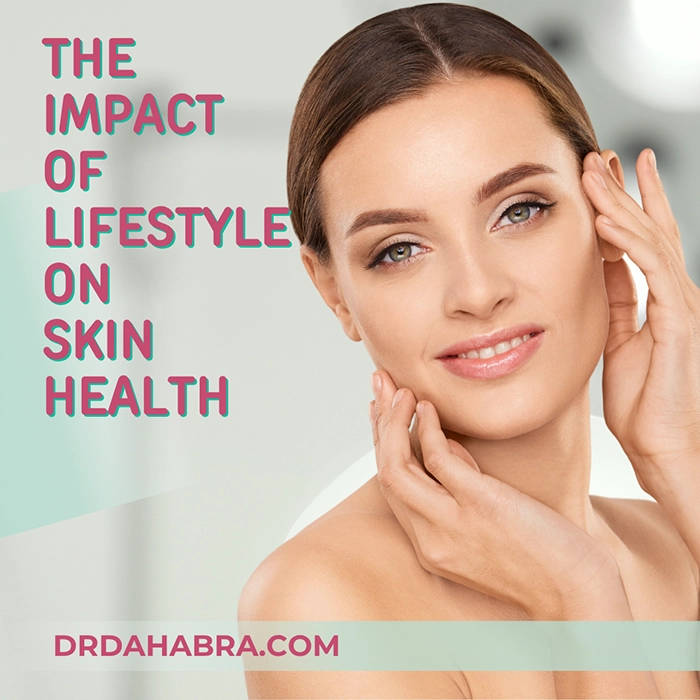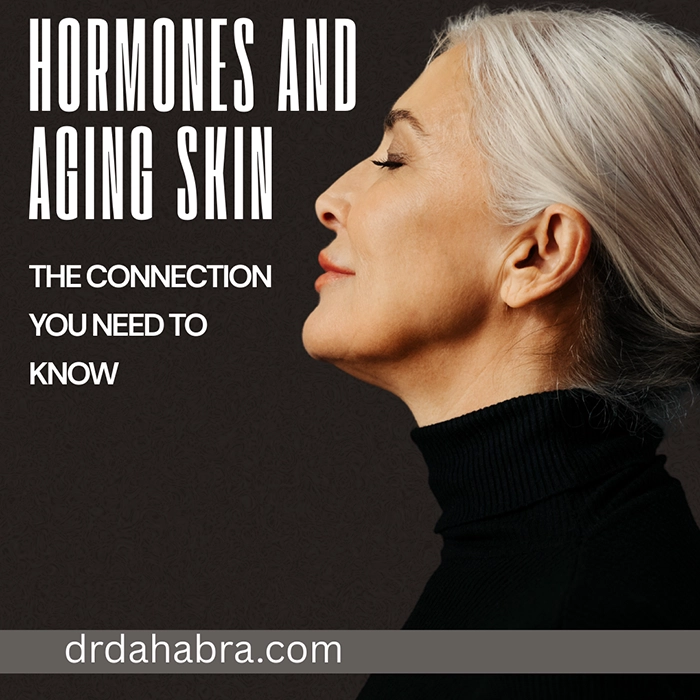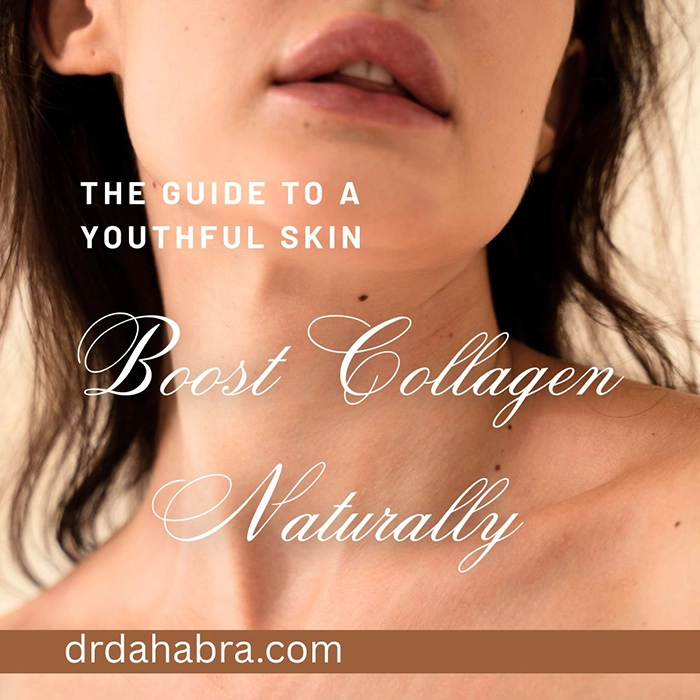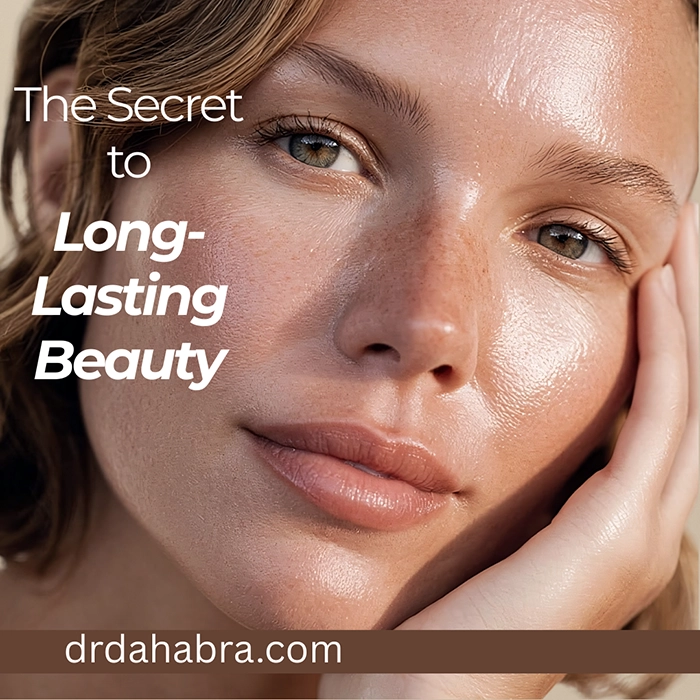The Incredible Impact of Lifestyle on Skin Health: An Aesthetics Specialist Guide
What Is the Relationship Between Lifestyle and Skin Health?
Our daily lifestyle choices, including what we eat, how we manage stress, and the environment in which we live, serve as building blocks for skin health. This article examines the impact of lifestyle on skin health, with an Aesthetic Specialist explaining the roles of diet, stress, and environmental factors.
A comprehensive, holistic skin care approach recognizes that the skin wellness journey begins from within. Your healthy skin routine isn’t just about what you apply topically; it’s also about your diet, sleep, exercise, mental balance, and environmental habits that shape it.
When you adopt lifestyle changes for healthy skin, you enhance skin barrier health, regulate inflammation, and support collagen production. This synergy between diet, rest, mindset, and environment has a profound impact on skin elasticity, resilience, and overall appearance.
It’s a powerful example of the lifestyle-skin connection in action.
Taking charge of these elements means practicing clear skin habits daily, such as eating a balanced diet, managing stress, protecting yourself from the sun and pollution, and prioritizing adequate rest.
The result?
A truly radiant complexion that reflects your overall well-being, from the inside out.
Table of Contents
1. How Does Your Daily Routine Affect Your Skin?
2. How Do We Define “Radiant” or “Glowing” Skin?
3. What Are the Common Signs of Unhealthy or Compromised Skin?
4. How Does What You Eat Affect Your Skin?
5. What Foods Are Essential for Promoting Clear and Healthy Skin?
6. How Does Sugar Intake Contribute to Skin Issues Like Acne and Aging?
7. Are Dairy Products Truly Linked to Skin Breakouts and Inflammation?
8. What Role Do Antioxidants and Vitamins Play in Skin Protection and Repair?
9. Can Gut Health Truly Impact the Appearance and Condition of Your Skin?
10. What Are the Best Hydration Strategies for Glowing Skin?
11. How Does Chronic Stress Directly Affect Your Skin’s Health?
12. What Skin Conditions Can Be Triggered or Worsened by Stress?
13. What Are Effective Stress Management Techniques for Better Skin?
14. How Does Sleep Quality Influence Skin Regeneration and Repair?
15. Frequently Asked Questions (FAQs)
16. Conclusion
17. References
1. How Does Your Daily Routine Affect Your Skin?
A consistent healthy skin routine is your foundation for a lasting glow.
Morning and evening rituals, such as cleansing, hydration, sun protection, and gentle care, help maintain skin barrier health, support cleansing cycles, and reduce environmental stress on the skin. Daily choices can profoundly shift your skin’s tone and texture.
When daily habits include sun protection and shielding from pollution, you can prevent long-term damage, such as premature aging and breakouts. Even simple steps, such as washing your face after outdoor exercise, help flush out pollutants and maintain a radiant complexion.
Incorporating natural skin care, layering antioxidants, and using non-comedogenic moisturizers contributes to balanced hydration and texture. Over time, these clear skin habits compound into consistent improvements, revealing your skin’s true potential.
2. How Do We Define “Radiant” or “Glowing” Skin?
“Radiant” or “glowing” skin typically refers to a complexion that appears clear, hydrated, evenly toned, and elastic. That glow comes from a healthy skin barrier, minimal inflammation, and good blood circulation, a combination of beauty from within and effective external care.
Achieving that glow involves a healthy skin diet rich in antioxidants and hydration, along with glowing skin tips such as daily moisturization, balanced sleep, and stress reduction. Collagen production and lifestyle converge to give your skin that lit-from-within shine.
Essentially, radiant skin is the outward indication of internal harmony, achieved through a balanced diet, stress management, adequate sleep, and lifestyle choices that support cell turnover, moisture retention, and color clarity. It’s the goal of every skin wellness journey!
3. What Are the Common Signs of Unhealthy or Compromised Skin?
Unhealthy skin often reveals itself through dryness, flakiness, redness, or sensitivity; that’s your skin signaling an imbalance. A weakened skin barrier invites more irritation, sensitivity to products, and increased environmental skin damage.
Breakouts, uneven texture, fine lines, and blotchiness often signal underlying issues such as inflammation, sun exposure, or stress. These are common among individuals who neglect lifestyle changes for healthy skin or skip sun protection habits in their daily routines.
If you notice frequent flare-ups, dullness, or loss of elasticity, it’s time to reassess your skincare habits. These signs often respond well to minor tweaks in diet, hydration, rest, and mindful self-care.
4. How Does What You Eat Affect Your Skin?
What you eat impacts everything from oil production to collagen strength; this is the impact of diet on skin health. A healthy skin diet rich in whole foods, such as fruits, vegetables, lean protein, nuts, and seeds, supports skin barrier health, helps combat inflammation, and provides essential antioxidants.
High-sugar or high-fat processed diets can fuel inflammation, clog pores, and accelerate skin aging, emphasizing the need for acne diet solutions and anti-inflammatory skin care plans. These help reduce skin inflammation and encourage a radiant complexion.
On the other hand, nourishing with hydration, omega-3s, fiber, and antioxidants, part of a “beauty from within” ethos, encourages collagen production. It promotes lifestyle synergy, resulting in smoother, more elastic, and brighter skin.
5. What Foods Are Essential for Promoting Clear and Healthy Skin?
To support clear skin habits, incorporate foods rich in antioxidants and vitamins, such as berries, leafy greens, fatty fish, nuts, and seeds. These foods enhance sun protection habits from the inside out and support healthy skin barrier function.
In addition, fiber-rich whole grains and fermented foods support gut health and skin, which is vital for managing inflammation and breakouts. We call it beauty from within, and nurturing your system shows up in a clearer, more vibrant complexion.
Including sources of omega-3s, zinc, vitamin C, and probiotics helps support collagen production and promotes a lifestyle that fosters vibrant, elastic, and balanced skin health.
6. How Does Sugar Intake Contribute to Skin Issues Like Acne and Aging?
Excessive sugar disrupts your skin’s homeostasis by triggering glycation, damaging collagen, and causing loss of elasticity, fine lines, and dullness. It’s a core example of the impact of diet on skin health and crops up in anti-aging lifestyle issues.
Sugar also fuels stress and acne flare-ups by amplifying inflammatory responses and raising insulin levels, which can exacerbate oil production and clogged pores. That’s why many people experience breakouts from sugary and processed foods.
Reducing sugar intake helps maintain a more stable, hydrated complexion and supports natural skin care efforts. It’s a decisive step in any acne diet solution and a key strategy for reducing skin inflammation.
7. Are Dairy Products Truly Linked to Skin Breakouts and Inflammation?
Many people find dairy fuels inflammation, especially skim milk, which may spike insulin and stimulate oil production. Anecdotal reports often suggest a connection between dairy and adult acne in their skin wellness journey.
However, research is mixed; some individuals see improvements after cutting dairy, others don’t. That’s why acne diet solutions should be personalized, monitored over time, and aligned with natural skin care.
Removing dairy can help reduce redness and inflammation if you’re sensitive to it, but if not, focus on balanced protein sources, a healthy diet, and maintaining skin barrier health while observing your skin’s response.
8. What Role Do Antioxidants and Vitamins Play in Skin Protection and Repair?
Antioxidants, such as vitamins C, E, and A, help neutralize free radicals from the sun and pollution, supporting the defense against environmental skin damage. They also encourage collagen production and lifestyle, improving elasticity and tone.
Topical antioxidants, combined with natural, skincare-rich foods such as berries, citrus fruits, and nuts, can enhance sun protection habits and help mitigate premature aging. Consuming antioxidants is part of a smart anti-aging lifestyle.
These nutrients also aid in barrier repair, reduce inflammation, support glowing skin, and help maintain a firm, resilient, radiant complexion.
9. Can Gut Health Truly Impact the Appearance and Condition of Your Skin?
Your gut microbiome influences systemic inflammation and immune function through the gut-skin axis, a primary connection between lifestyle and skin health. Good gut health and skin support help reduce irritations like acne and eczema.
We see how leaky gut or dysbiosis correlates with skin inflammation, fiber, fermented foods, and probiotics support healthy gut flora and help reduce skin inflammation, leading to a clearer tone and a more substantial barrier.
This is a core concept in the philosophy of beauty from within. When your gut thrives, your skin reflects it, radiant, calm, and more resistant to breakouts and barrier breakdowns.
10. What Are the Best Hydration Strategies for Glowing Skin?
Hydration isn’t just about drinking water; it’s internal hydration plus topical moisture retention. Aim for a daily water intake, plus hydrating foods like cucumbers, watermelon, and lettuce to support a healthy skin diet.
Externally, use moisturizers with humectants like hyaluronic acid and glycerin to lock in water. Maintain skin barrier health by avoiding harsh ingredients and applying moisturizer immediately after bathing.
Hydrating routines are essential for achieving a glowing skin and radiant complexion, promoting plumpness, reducing flakiness, and maintaining elasticity for smoother, well-nourished skin.
11. How Does Chronic Stress Directly Affect Your Skin’s Health?
Chronic stress spikes cortisol, which breaks down collagen, thins the skin barrier, increases dryness, and triggers breakouts, a hallmark of stress’s impact on the skin.
Stress also impairs the immune response, heightening sensitivity and slowing wound healing, compromising skin barrier health, and exacerbating conditions like eczema or psoriasis flare-ups, which are common in individuals experiencing stress and acne flare-ups.
Curating a holistic skincare approach that incorporates stress management techniques, such as meditation, exercise, and therapy, can dramatically reverse these effects and strengthen natural skincare from the inside out.
12. What Skin Conditions Can Be Triggered or Worsened by Stress?
Stress can trigger acne, eczema, psoriasis, hives, and rosacea. It promotes overactivity of the oil glands, barrier disruption, and immune imbalance, all pathways that lead to skin inflammation and sensitivity.
For acne, stress can trigger cystic breakouts and persistent inflammation, intensifying the need for effective acne diet solutions and healthy skin habits. For eczema and rosacea, stress can tip the immune system towards flare-ups by weakening the health of your skin’s barrier.
Understanding this stress-skin connection means addressing lifestyle stressors, improving sleep quality and skin health, and incorporating calming self-care rituals to help soothe and protect your skin.
13. What Are Effective Stress Management Techniques for Better Skin?
Simple methods, such as mindfulness meditation and deep breathing, reduce cortisol levels and support skin recovery. Activities like walking in nature or yoga add both movement and calm to your anti-aging lifestyle.
Other effective routines include journaling, engaging in structured hobbies, practicing digital detox, and establishing a relaxing bedtime routine, all of which are closely tied to improving sleep quality, enhancing skin health, and promoting overall emotional balance.
Pair these with clear skin habits, such as skincare self-massage, hydration breaks, and gentle movement, to promote both mental wellness and improved skin resilience and glow.
14. How Does Sleep Quality Influence Skin Regeneration and Repair?
Sleep is when your skin undergoes major repair, collagen production peaks, cell turnover rises, and hydration levels rebalance. Poor sleep disrupts these processes, leading to dullness, sagging, and compromised skin barrier health.
A chronic lack of sleep leads to inflammation and spikes in stress hormones, which directly affect the skin and accelerate the aging process. That’s why good sleep quality and skin are tightly linked.
Prioritizing a consistent sleep rhythm, calming rituals, and a cool, dark environment supports a robust skin repair cycle. It optimizes natural skin care, contributing to a truly radiant complexion over time.
15. Frequently Asked Questions (FAQs) about The Impact of Lifestyle on Skin Health: Diet, Stress, and Environmental Factors Explained by an Aesthetics Specialist
Q1. Why is a strong skin barrier so crucial for overall skin health?
Concise Answer: It protects your skin from moisture loss, irritants, and environmental damage.
Detailed Answer: Your skin barrier acts like a shield, keeping good things in, such as moisture and nutrients, and bad things out, including bacteria, allergens, and pollutants. When it’s compromised, your skin may become dry, red, irritated, or prone to acne.
A strong barrier is vital for resilience and balance. Maintaining it with gentle cleansers, hydration, and a nutrient-rich healthy skin routine supports healing and reduces sensitivity.
It’s also key in defending against environmental skin damage.
Q2. What is the primary impact of UV radiation on skin aging and health?
Concise Answer: UV radiation accelerates the aging process and increases the risk of skin cancer.
Detailed Answer: Chronic sun exposure breaks down collagen and elastin, leading to wrinkles, pigmentation, and loss of skin elasticity. This is known as photoaging. UVB rays also damage DNA in skin cells, increasing the risk of skin cancers.
Practicing daily sun protection habits, such as using SPF 30+ sunscreen, seeking shade, and wearing hats, helps protect the skin from premature aging and preserve a radiant complexion.
Q3. How does air pollution contribute to skin damage and premature aging?
Concise Answer: It causes oxidative stress, leading to inflammation, dullness, and wrinkles.
Detailed Answer: Pollutants such as smog, dust, and toxic gases generate free radicals that damage skin cells, accelerate aging, and compromise skin barrier health. Pollution can also worsen acne and eczema by clogging pores and triggering immune responses.
To protect your skin, use pollution-protecting skincare products, cleanse gently after outdoor exposure, and boost your defense with antioxidant-rich natural skincare and a balanced diet.
Q4. What are common environmental allergens that irritate the skin?
Concise Answer: Pollen, mold, pet dander, and dust mites are common triggers of skin reactions.
Detailed Answer: Environmental allergens can cause itchy, red, inflamed skin, especially in people with eczema or sensitive skin. These particles break through weakened barriers, causing flare-ups.
Using an air purifier, washing bedding regularly, and avoiding harsh soaps help minimize reactions. Additionally, strengthening your skin barrier health through a balanced diet and natural skin care can help reduce sensitivity.
Q5. How does climate (humidity, dryness) affect different skin types?
Concise Answer: Dry climates can dehydrate the skin; humid climates, on the other hand, can trigger oiliness and breakouts.
Detailed Answer: In low humidity, the skin loses moisture quickly, which weakens the barrier and can cause flaking and tightness. In high humidity, sweat and oil production increase, potentially clogging pores.
Adapting your skincare to the climate, using lighter creams in humid conditions and richer moisturizers in dry conditions, helps maintain balance. It’s also essential for keeping up a consistent healthy skin routine.
Q6. What steps can you take to shield your skin from environmental aggressors?
Concise Answer: Use sunscreen, antioxidants, gentle cleansers, and barrier-repair moisturizers daily to protect your skin.
Detailed Answer: To protect against environmental skin damage, layer your defenses: start with a broad-spectrum SPF, add serums with vitamins C and E, and cleanse to remove pollutants. Indoor air quality matters too; air purifiers and houseplants help reduce indoor pollution.
Consistent routines combined with lifestyle habits (like a healthy skin diet and hydration) keep skin resilient and reduce the visible effects of urban living.
Q7. How important is a consistent skincare routine alongside lifestyle changes?
Concise Answer: It enhances the results of a healthy lifestyle by protecting and repairing the skin.
Detailed Answer: While diet, sleep, and stress play a foundational role, a consistent topical routine supports those internal improvements. Cleansing, moisturizing, and protecting your skin daily helps maintain hydration, reduce irritation, and optimize skin renewal.
Combining this with lifestyle changes for healthy skin amplifies outcomes. Think of your skincare as the outer layer of your overall wellness plan.
Q8. What are the benefits of regular exercise for skin circulation and detoxification?
Concise Answer: Exercise improves blood flow and promotes healthy skin cell turnover.
Detailed Answer: Physical activity boosts oxygen and nutrient delivery to skin cells, enhancing that natural glow and improving tone. Sweating also helps flush toxins through the pores.
Regular movement helps reduce stress hormones, supports collagen production, and promotes a lifestyle synergy, thereby helping to regulate inflammation. Just be sure to wash your face after a workout to prevent clogged pores and maintain healthy, clear skin.
Q9. Can smoking and alcohol consumption severely damage your skin?
Concise Answer: Yes—both contribute to premature aging, dullness, and skin dehydration.
Detailed Answer: Smoking reduces blood flow and depletes skin of oxygen and nutrients, leading to wrinkles and a leathery texture. Alcohol dehydrates your skin, inflames it, and may trigger acne or rosacea, both of which damage collagen and elastin, impairing healing and compromising skin barrier health.
Quitting or minimizing these habits significantly enhances your anti-aging lifestyle goals.
Q10. How can proper hygiene prevent common skin problems?
Concise Answer: It removes bacteria, oil, and pollutants that cause breakouts and irritation.
Detailed Answer: Washing your face twice daily, changing your pillowcases regularly, and avoiding touching your face are key habits for clear skin. Cleanliness prevents clogged pores, bacterial infections, and the buildup of irritants.
Maintaining good hygiene, especially after sweating or exposure to the outdoors, helps protect your skin and supports your overall natural skin care efforts.
Q11. How can lifestyle changes help manage acne and breakouts?
Concise Answer: An improved diet, stress reduction, and good sleep can help reduce flare-ups.
Detailed Answer: Shifting to a low-glycemic, dairy-free, anti-inflammatory diet often helps manage acne. Adding probiotics can improve gut health, while regular sleep and stress relief can help prevent hormonal spikes that cause breakouts.
These acne diet solutions and holistic habits form the backbone of managing acne beyond just topical treatments.
Q12. What dietary and stress interventions can reduce redness and inflammation?
Concise Answer: Eating anti-inflammatory foods and managing stress can help calm skin irritation.
Detailed Answer: Omega-3 fatty acids, leafy greens, berries, and turmeric all help reduce skin inflammation. Avoiding processed foods and managing stress through breathing exercises, therapy, or physical movement helps support your skin’s healing.
When the gut and nervous system are calm, your skin often follows, another win for beauty from within.
Q13. Are there lifestyle habits that can help minimize the appearance of fine lines and wrinkles?
Concise Answer: Hydration, sun protection, antioxidants, and sleep help reduce wrinkles naturally.
Detailed Answer: Protecting your skin with SPF and antioxidants shields against photoaging. Drinking enough water and using hydrating skincare plumps up skin and smooths lines.
Prioritizing good sleep and cutting sugar helps protect collagen. These anti-aging lifestyle tweaks are powerful when practiced daily.
Q14. How can you naturally improve skin elasticity and firmness?
Concise Answer: Through collagen-supporting foods, strength training, and quality rest.
Detailed Answer: Foods rich in vitamin C, protein, and antioxidants aid collagen synthesis. Regular exercise boosts circulation and muscle tone under the skin.
Deep sleep allows regeneration. Together, these strategies enhance skin elasticity and delay sagging, which is essential in any lifestyle-skin connection.
Q15. What’s the best way to maintain a youthful glow as you age?
Concise Answer: Maintain a balanced diet, stay hydrated, get enough sleep, protect your skin from the sun, and manage stress for glowing skin.
Detailed Answer: Glowing skin at any age reflects your inner health. Focus on a nutrient-rich, healthy skin diet, consistent sun protection habits, stress control, and restorative sleep.
Supplement with topical care and avoid harsh routines that disrupt the skin barrier health. It’s not just skincare, it’s your entire skin wellness journey that matters.
16. Conclusion: The Impact of Lifestyle on Skin Health: Diet, Stress, and Environmental Factors Explained by an Aesthetic Specialist
Your skin is more than just a surface; it’s a mirror reflecting how you live, what you eat, how you feel, and how you care for yourself. It tells your story in every glow, every wrinkle, every flare-up.
And the incredible truth?
You have more control over that story than you think. Every bite you take, every hour of rest, every mindful breath shapes your skin’s destiny.
This is not just skincare, it’s soul care, rooted in the connection between your inner world and outer beauty.
Imagine waking up to see your skin looking calm, clear, and radiant, not because of expensive products or cosmetic procedures, but because you’ve chosen to nurture your body, calm your stress, nourish your gut, and protect yourself from environmental toxins.
That’s the real magic. When your lifestyle aligns with your skin’s needs, you unlock a glow that no highlighter can fake.
Your skin begins to thank you in the form of resilience, smoothness, and a youthful vitality that genuinely comes from within.
Let this be your turning point. Whether you’re battling acne, signs of aging, or dullness, your journey to vibrant, healthy skin starts with small, daily choices.
Eat with intention.
Rest with purpose.
Move with joy.
Protect with care.
Love your skin the way it longs to be loved, from the inside out.
This is your skin wellness journey, and every day is a new chance to glow with confidence, peace, and power.
Your healthiest, most radiant skin is waiting for you to show up.
We have covered everything about the impact of lifestyle on skin health: diet, stress, and environmental factors explained by an Aesthetics Specialist.
The Impact of Lifestyle on Skin Health: Diet, Stress, and Environmental Factors Explained by an Aesthetics Specialist
The impact of lifestyle on skin health: diet, stress, and environmental factors explained by Dr. Dahabra. Why wait to unlock your beauty?
Call us now at (954) 595-2607 or book online. Your journey begins with just a click or a call.
Embrace the beauty, embrace innovation – Embrace You.
17. References
Beverly Hills Wellness Center & Med Spa, Florida
Diet and Skin Aging—From the Perspective of Food Nutrition
PMC, NCBI
This study investigates the impact of nutritional imbalances and the consumption of processed foods on accelerating skin aging and compromising collagen integrity.
PMC, NCBI
A comprehensive review exploring how gut and skin microbiome dysbiosis, influenced by diet, impact conditions like acne, eczema, and psoriasis.
Impact of Gut Microbiome on Skin Health: Gut–Skin Axis Observations
PMC, NCBI
This article outlines the mechanisms of the gut-skin axis and how prebiotics, probiotics, and diet influence inflammatory skin disorders.
Adult Skin Acute Stress Responses to Short-Term Environmental and Internal Stressors
PMC, NCBI
Examines how brief psychosocial stress, poor diet, and lack of sleep trigger inflammatory responses and compromise skin barrier health.
Examining How Diet and Lifestyle Influence Skin Appearance
MDPI
Highlights links between high-fat/sugar diets, oxidative stress, and inflammation—key drivers of skin aging and impaired healing.
Enhancing Skin Anti-Aging through Healthy Lifestyle Factors
MDPI
Discusses how nutrition, sleep, exercise, and social connections collectively support dermal health and slow the aging of skin.
Oxidative Stress and Gut Microbiome in Inflammatory Skin Diseases
Frontiers in Cell and Developmental Biology
Reviews how oxidative stress and gut microbiota interactions play a central role in inflammatory skin conditions and therapy.
The Potential of Exercise on Lifestyle and Skin Function: Narrative Review
JMIR Dermatology
Covers how regular exercise enhances skin blood flow, moisture retention, mitochondrial health, and stress resilience.
The Role of Probiotics in Skin Health and the Gut–Skin Axis
MDPI – Nutrients
Explores how probiotics can modulate gut microbiota, reduce oxidative stress, and improve acne, eczema, and barrier function.
Environmental Stressors on Skin Aging: Mechanistic Insights
Frontiers in Pharmacology
A detailed analysis of how UV radiation, pollutants, and tobacco smoke drive photoaging, cellular damage, and carcinogenesis.




